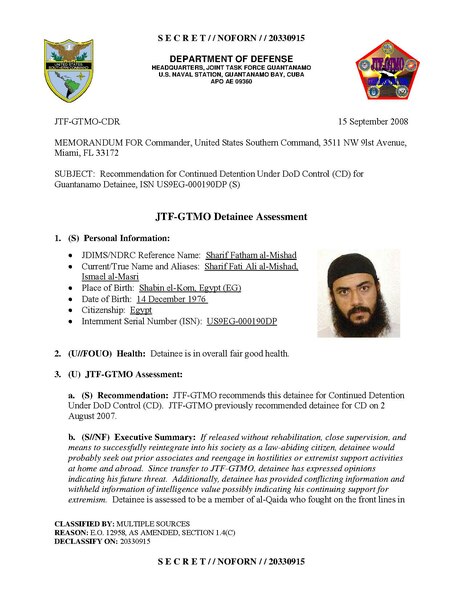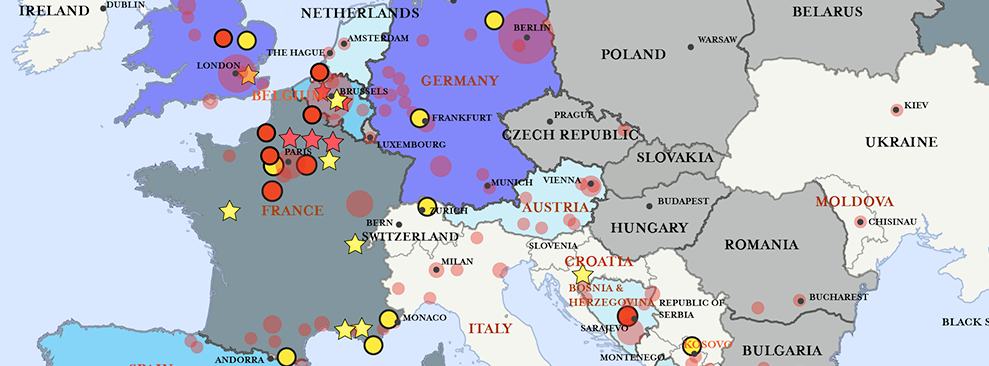Obama to Release Ex-Fighter from Bin Laden’s 55th Arab Brigade From Gitmo
The Pentagon plans to transfer roughly a dozen detainees from the Guantanamo Bay military prison to other nations, including an Islamic extremist who fought in Osama bin Laden’s 55th Arab Brigade.
The 055 Brigade (or 55th Arab Brigade) was an elite guerrilla organization sponsored and trained by Al Qaeda that was integrated into the Taliban army between 1995 and 2001.
U.S. officials confirmed to the Washington Post Wednesday that Tarik Ba Odah, a Yemeni who has been on a hunger strike for more than nine years, would be among those resettled within the next few weeks in at least two cooperating countries.
The military has force-fed 37-year-old Ba Odah through a nasal tube since he began his fast in 2007, Reuters reported. In December, his body weight had dropped by half, falling from 148 pounds to 75.
The U.S. Department of Defense file for the detainee, published by the New York Times, provides insight into his ties to Osama bin Laden.
“[Ba Odah] is assessed to be an Islamic extremist and possible member of al-Qaida. Detainee served as a fighter in Osama bin Laden’s 55th Arab Brigade, and participated in hostilities against U.S. and coalition forces in [bin Laden’s] Tora Bora Mountain complex where he probably manned a mortar position. Detainee is reported as being an important man with close ties to senior al-Quaida members including [bin Laden],”the file reads.
Ba Odah also confirmed to U.S. officials that he received militant training and advanced artillery training from al Qaeda, according to the report.
When officials assessed Ba Odah in 2008 for continued detention, the Department of Defense classified him as a high risk threat to the U.S. and its allies.
He was also classified as a high-risk threat from a detention perspective for his noncompliance and hostility toward Guantanamo guards. As of January 2008, he had received 81 reports of disciplinary infraction. Incidents included Ba Odah spraying a mix of feces, urine, and water out of his cell and spitting on a guard, according to the file.
In 2009, Ba Odah was clear for transfer under certain security conditions, but Congress has since banned repatriations to Yemen.
The officials declined to identify the countries that agreed to resettle the prisoners.
Guantanamo currently holds 91 detainees. Thirty-seven prisoners have been approved for repatriation or resettlement.
President Obama vowed to close the military prison after taking office in 2009 and has since transferred, resettled, or repatriated 147 detainees. Obama’s plan to close the prison, which he recently delivered to Congress, would involve moving dozens of prisoners not approved for transfer to other countries to the United States.
Current law bars the transfer of Guantanamo prisoners to detention facilities inside the U.S., but Obama has threatened to circumvent the congressional ban through executive action.
****
In part from FNC: The next round of Gitmo transfers will begin this weekend with two detainees going an undisclosed country in Africa.
In January, the Pentagon conducted a bulk transfer of 10 detainees at once, the largest transfer from the U.S. Naval Station at Guantanamo, Cuba to date.
This next transfer of Gitmo detainees can’t happen all at once because the Pentagon is required by law to notify Congress 30-days before any transfers.
Capitol Hill sources tell Fox News that period has not elapsed yet for all the transfers.
The first notification went to Congress in early March and the second one in the middle of this month.
The president’s critics in Congress point out that in addition to keeping terrorists from returning to the fight, they also demand a plan for handling ISIS detainees, now that a 200-man special operations task force fighting ISIS and recently killed the group’s second in command last week.
The U.S. military has no plans to hold captured Islamic State operatives for more than a month before turning them over to the Iraqi government, a spokesman for the U.S.-led coalition based in Baghdad told reporters recently.
“Fourteen to 30 days is a ballpark figure, but even that is not really completely nailed down,” said Col. Steve Warren, a U.S. military spokesman based in Baghdad. “There isn’t a hard definition of short-term.”
Earlier this month, Pentagon Press Secretary Peter Cook also made clear that the policy for holding operatives is, at best, evolving. He said they would be handled on a “case-by-case” basis over a “short-term” period.
The lack of a well-defined policy for handling captured ISIS terrorists is in turn raising concerns on Capitol Hill.
“The law requires a comprehensive detainee policy,” a congressional aide said. “By definition, ‘we’ll figure it out if we ever capture anyone’ is not a comprehensive policy. “
Warren said that two airstrikes against ISIS chemical weapons facilities were conducted following a recent mission carried out by a US special ops assault force capturing an ISIS operative linked to its chemical weapons program.
*****
In part from Time: While hundreds of inexperienced Pakistani, Sudanese and other Muslim faithful enter Afghanistan every week to join the Taliban army, the estimated 1,000 Arabs of Brigade 055 have been in the country for years. Trained in bin Laden’s terror camps, they are the Taliban’s most dedicated and highly skilled soldiers–the elite of the roughly 5,000 al-Qaeda fighters on the ground.
About 100 of the very best serve as bin Laden’s personal security detail. Most are veterans of battles against regimes in their homelands or the mujahedin war against the Soviets in Afghanistan. Primarily led by Egyptian and Saudi revolutionaries, Brigade 055 (the unit began as a Soviet-era Afghan-government outfit) also includes volunteers from Chechnya, Pakistan, Bosnia, China and Uzbekistan.
Like most al-Qaeda terrorists, brigade members are fervently committed to bin Laden’s cause, and will literally fight to the death. “They give no quarter, and they expect no quarter,” says an official at the Pentagon’s Defense Intelligence Agency. At the moment, they’re helping out at key strategic northern cities like Mazar-i-Sharif, Taloqan and Jalalabad –and, not surprisingly, becoming a major target of U.S. firepower. More here.





